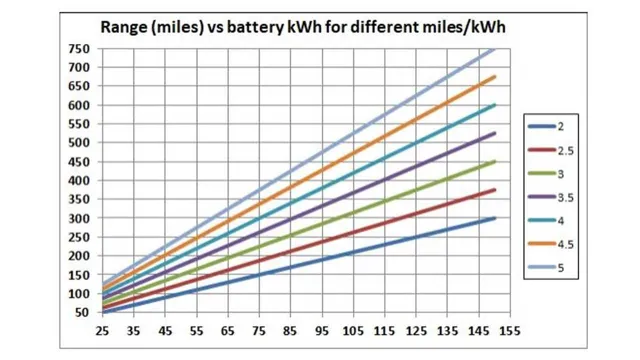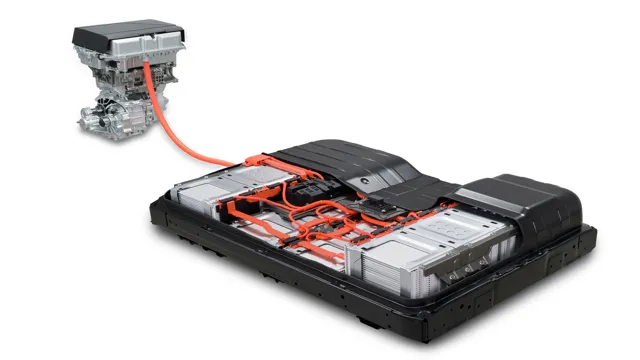Revolutionizing Road Trips: The Latest Electric Car Battery Range Improvements
Electric cars have been around for a while, but their battery range has always been a concern for potential buyers. After all, what good is a car that can’t take you where you need to go? Luckily, there have been recent developments in electric car battery technology that have significantly increased their range. With these improvements, the future of electric cars looks bright – they may soon become a viable option for even more drivers.
So, what exactly are these range improvements, and how are they changing the game for electric cars? Let’s dive in and find out.
The Current State of Electric Car Battery Range
Electric car battery range improvements have come a long way in recent years, with some of the latest models boasting impressive ranges of over 300 miles on a single charge. This is a significant improvement from just a few years ago when most electric vehicles could only travel up to 100 miles on a single charge. Not only are manufacturers working on developing batteries with higher energy densities, but they are also working on improving the overall efficiency of the vehicles to help extend the range.
One of the most exciting developments in this field is solid-state batteries, which could potentially double the range of current lithium-ion batteries while being safer and more environmentally friendly. As battery technology continues to improve, electric cars are becoming more and more viable options for mainstream consumers.
Data on average battery range of current electric cars
Electric car battery range has come a long way in recent years. With advancements in technology and increased demand for electric vehicles, manufacturers have been making great strides in improving the average battery range of electric cars. Currently, the average battery range for an electric car is around 250 miles on a single charge.
However, this number can vary depending on the make and model of the car. For example, the Tesla Model S has an impressive range of up to 402 miles. On the other hand, the Nissan Leaf has a more modest range of around 150 miles.
It’s important to note that battery range can also be affected by external factors such as weather conditions and driving habits. Nonetheless, electric car battery range has come a long way and is expected to continue improving in the years to come as technology improves and infrastructure expands.

Impact of temperature, terrain, and driving habits on range
Electric car battery range is affected by several factors, including temperature, terrain, and driving habits. These variables all play a significant role in how far an electric vehicle can travel on a single charge. Warmer temperatures are generally better for battery performance, whereas colder temperatures have a negative impact.
Similarly, uphill driving and bumpy terrain can also decrease range, as can aggressive driving habits like rapid acceleration and excessive speeding. On the other hand, smooth, level driving on flat terrain and consistent speeds can increase range. It’s important for electric car owners to understand these factors and adjust their driving accordingly.
By doing so, they can maximize their vehicle’s range and get the most out of their investment.
Recent Advances in Battery Technology
Electric car battery range improvements have been a major focus for the industry in recent years. With the need for eco-friendly transportation becoming more pressing, advancements in battery technology have been crucial in meeting these demands. Lithium-ion batteries have been the go-to option for electric cars, providing higher energy density and longer range, but they do have limitations.
However, new breakthroughs in battery materials and designs have led to significant improvements in the performance of lithium-ion batteries. For example, the use of solid-state electrolytes promises to increase energy density even further, while reducing the risk of safety hazards associated with liquid electrolytes. In addition, the use of silicon anodes instead of graphite-based ones can also significantly increase the energy density of lithium-ion batteries.
With these developments, electric car manufacturers are now able to produce vehicles that can travel further and longer between charges, making them more practical and appealing to consumers.
Overview of new battery types and chemistries
In recent years, there have been significant advancements in battery technology, paving the way for new battery types and chemistries. One notable advance is the development of lithium-sulfur batteries, which offer a higher energy density than traditional lithium-ion batteries and are potentially more environmentally friendly. Another promising new battery type is the solid-state battery, which uses a solid electrolyte instead of a liquid one, making them safer and less flammable.
Additionally, researchers are exploring new chemistries such as sodium-ion and zinc-air batteries, which offer cost and sustainability advantages. With these advancements, it is likely that the use of batteries in various applications will only continue to grow, from electric vehicles to renewable energy storage. As society continues to prioritize sustainability and efficiency, the development of new and innovative battery technology will play a crucial role in achieving these goals.
Data on increased range from current and upcoming models
In recent years, we have seen significant advancements in battery technology in the automotive industry which have resulted in increased range for electric vehicles. With current and upcoming models, drivers can now travel for longer periods without needing to stop and recharge their batteries. This increased range is due to the development of new types of batteries and improved manufacturing processes, which make batteries lighter, more efficient, and longer-lasting.
Lithium-ion batteries are currently the most common type used in electric vehicles, but there are other promising technologies on the horizon, including solid-state batteries and lithium-sulfur batteries which offer even greater energy density. As battery technology continues to improve, we can expect to see even more impressive ranges for electric vehicles in the future. This is a great step forward in the fight against climate change, as more people are encouraged to switch to electric vehicles knowing they have the range to cover a significant distance without the fear of running out of power.
Potential implications on charging infrastructure
With recent advances in battery technology, we could see potential implications on the charging infrastructure for electric vehicles. One of the main challenges of EV adoption is the need for an expansive charging infrastructure. However, with longer-lasting and more efficient batteries, the need for frequent charging would decrease, potentially reducing the need for as many charging stations.
Additionally, new battery technologies may allow for faster charging times, making it possible to recharge EVs in a matter of minutes rather than hours. This could greatly improve the convenience and practicality of EVs, as drivers would no longer need to plan extended charging stops during long trips. As the popularity of electric vehicles continues to grow, improvements in battery technology will be a critical factor in shaping the future of the charging infrastructure.
Tips for Maximizing Your Electric Car’s Range
If you’re an electric car owner, maximizing your battery range is essential. Fortunately, there are several ways you can improve your electric car’s battery range to get the most out of your vehicle. One way is by utilizing regenerative braking, which helps recharge the battery as you slow down or come to a stop.
Another way is by staying within the recommended speed limit, as speeding can quickly deplete your battery. Additionally, limiting your use of climate control features, such as heating and A/C, can also help improve your car’s battery range. And finally, planning your route to include charging stations can ensure that you’re not left stranded with a dead battery.
By incorporating these tips into your electric car driving routine, you can feel confident in getting the most out of your vehicle’s battery range.
Best practices for driving to increase range
When it comes to electric cars, getting the most range out of each charge is essential. There are several ways to maximize your electric car’s range, starting with how you drive. One best practice when driving an electric car is to be mindful of your speed.
Higher speeds can decrease range, so it’s best to maintain a steady pace and avoid sudden accelerations or braking whenever possible. Additionally, using cruise control on the highway can help you maintain a more consistent speed and conserve energy. Another tip to keep in mind is to avoid excessive idling or warming up your car.
Not only is this a waste of energy, but it can also negatively impact your battery’s health. Finally, don’t forget to utilize regenerative braking, which can help recharge your battery while you’re driving and extend your electric car’s range. By following these best practices, you can get the most out of your electric car and enjoy a longer, more efficient driving experience.
Maintenance and upkeep to optimize battery performance
Electric cars offer a cleaner and more efficient option for commuting, but their range can be a concern for drivers. It’s essential to establish a maintenance and upkeep routine to maintain your battery performance and extend your electric car’s range. Firstly, ensuring your tire pressure is at the recommended level for your electric car is crucial.
Your battery might be working hard to get you to your destination if your tire pressure is low, causing it to drain faster and limit your range. Secondly, avoiding excessive acceleration and braking can also help extend your range. Try to maintain a steady speed and plan your route ahead of time, avoiding high-traffic areas or roads with steep hills.
Lastly, use the appropriate charging strategies. Charging to 80% or less and topping up regularly will increase your battery’s longevity and improve your range. By following these tips and taking good care of your electric car battery, you can maximize its performance and enjoy the benefits of eco-friendly driving.
Future Directions for Electric Car Battery Range
Electric car battery range improvements are among the most sought-after goals in the automotive industry. While we have already seen a significant increase in EV ranges, many automakers are still exploring ways to further extend these ranges. One approach that is gaining traction is the use of solid-state batteries instead of traditional lithium-ion batteries.
Solid-state batteries provide higher energy densities, are less prone to overheating, and are more environmentally friendly. Another technology that could improve EV ranges is wireless inductive charging, which would allow for vehicles to charge their batteries while in motion or parked. Lastly, automakers are also looking at improving the overall efficiency of electric vehicles by reducing their weight, incorporating regenerative braking systems, and utilizing more aerodynamic designs.
With these developments, it is clear that the future of electric cars is bright, and we can expect to see even more significant advancements in battery range improvements.
Upcoming research and development projects
As electric cars gain popularity, the demand for long battery range becomes increasingly important. One upcoming research and development project aims to tackle this issue by exploring new battery technology. This project hopes to develop batteries that are lighter, smaller, and can hold more charge, ultimately resulting in an increase in the range of electric cars.
The use of solid-state batteries is also being studied, as they have the potential to provide a more stable and safer alternative to the current lithium-ion batteries. Additionally, companies are exploring wireless charging technology, which could eliminate the need for drivers to stop and plug in their cars. With these exciting developments on the horizon, it’s clear that the future of electric car battery range is bright.
Potential impact on electric car adoption and market growth
The future of electric cars is looking brighter than ever thanks to advancements in battery technology. One of the biggest challenges preventing widespread adoption is range anxiety, or the fear of running out of battery power before reaching a destination. As battery capacity continues to improve, however, this concern becomes less and less valid.
In fact, many newer electric cars now boast a range of over 200 miles on a single charge, making them much more practical for everyday use. Increased battery range will undoubtedly drive market growth and encourage more consumers to make the switch to electric. With incentives like tax credits, lower operating costs, and improved infrastructure, electric cars are poised to become the future of transportation.
Conclusion
As the electric car battery technology continues to evolve, the range anxiety of drivers is gradually fading away. With each advancement, EVs are inching closer to becoming a practical alternative to gas cars. From the first electric car with a mere 40-mile range to today’s models offering over 300 miles, the industry is making tremendous strides in improving battery range.
It won’t be long before the days of recharging every few hours become ancient history, and EV drivers can hit the road with confidence knowing their car won’t leave them stranded. So, if you’re still skeptical about electric cars, get ready to be shocked by their ever-improving performance!”
FAQs
What are some recent advancements in electric car battery technology?
In recent years, there have been significant improvements in electric car battery range due to advancements in battery chemistry, such as the development of lithium-ion batteries and solid-state batteries.
How far can electric cars travel on a single charge?
The range of electric cars varies depending on the make and model, but many modern electric vehicles can travel up to 300 miles on a single charge.
How long does it take to charge an electric car battery?
The time it takes to charge an electric car battery depends on the battery size and the charging station’s capacity. A typical home charging station can take 8-12 hours for a full charge, while a fast charging station can charge up to 80% in less than 30 minutes.
Can improvements in electric car battery range make them a viable alternative to gasoline cars?
With significant advancements in electric car battery range and charging infrastructure, electric vehicles are becoming a more viable alternative to traditional gas-powered vehicles. As battery technology continues to improve, we can expect electric cars’ driving range to increase and prices to decrease.




